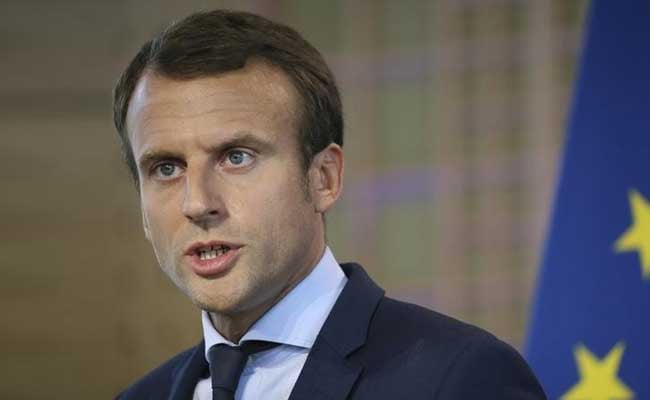
French politician Emmanuel Macron had resigned as France's economy minister on August 30.
London:
French politician Emmanuel Macron has said Britain's financial firms should only retain "passporting" rights to do business in Europe after Brexit if London keeps contributing to the European Union budget, according to the Guardian newspaper.
Macron, who resigned as France's economy minister on August 30 and is widely expected to run for the presidency next year, also suggested that London should not be able to continue to dominate euro-denominated clearing, the British newspaper reported.
Passporting rights, which allow British-based firms to operate across the European single market without the need for licences in individual countries, are seen as crucial to the future prospects of the City of London financial district.
"The financial passport is part of full access to the EU market and a precondition for that is the contribution to the EU budget. That has been the case in Norway and in Switzerland. That is clear," Macron was quoted as saying.
Passporting rights "should not be seen as a technical issue but as a matter of sovereignty," the Guardian quoted Macron as saying.
Ending contributions to the EU budget and spending the money domestically were central promises made by those campaigning for Brexit ahead of the June 23 referendum.
Britain's financial sector represents more than 10 percent of the country's economy, and many in the City have been concerned about the lack of clarity on what will happen to passporting rights after Brexit.
Britons voted in a referendum on June 23 to leave the bloc, but London has not yet triggered article 50, the formal step that will kick off negotiations on the terms of its exit.
Britain's finance minister Philip Hammond has said other EU countries would be making a "huge mistake" if they tried to break up London's dominance as a global financial centre after Brexit.
Hammond has also dismissed warnings that London risked losing its leading role in the clearing of euro-denominated financial transactions to European centres.
Macron took a different stance, telling the Guardian: "We have the eurozone. Could we accept to be cleared, regulated and de facto have inflows and outflows from a country that has decided to leave the EU? For me, definitely not."
Charlie Bean, a former deputy governor of the Bank of England, has said he was certain that London would lose its dominance of euro-denominated clearing.
A 38-year-old former investment banker, Macron is one of France's most popular politicians.
He has not confirmed explicitly that he will run in next year's presidential election, but quit President Francois Hollande's government saying he "needed to be free" to work on a plan to transform the country. He has founded his own party.
(Except for the headline, this story has not been edited by NDTV staff and is published from a syndicated feed.)
Macron, who resigned as France's economy minister on August 30 and is widely expected to run for the presidency next year, also suggested that London should not be able to continue to dominate euro-denominated clearing, the British newspaper reported.
Passporting rights, which allow British-based firms to operate across the European single market without the need for licences in individual countries, are seen as crucial to the future prospects of the City of London financial district.
"The financial passport is part of full access to the EU market and a precondition for that is the contribution to the EU budget. That has been the case in Norway and in Switzerland. That is clear," Macron was quoted as saying.
Passporting rights "should not be seen as a technical issue but as a matter of sovereignty," the Guardian quoted Macron as saying.
Ending contributions to the EU budget and spending the money domestically were central promises made by those campaigning for Brexit ahead of the June 23 referendum.
Britain's financial sector represents more than 10 percent of the country's economy, and many in the City have been concerned about the lack of clarity on what will happen to passporting rights after Brexit.
Britons voted in a referendum on June 23 to leave the bloc, but London has not yet triggered article 50, the formal step that will kick off negotiations on the terms of its exit.
Britain's finance minister Philip Hammond has said other EU countries would be making a "huge mistake" if they tried to break up London's dominance as a global financial centre after Brexit.
Hammond has also dismissed warnings that London risked losing its leading role in the clearing of euro-denominated financial transactions to European centres.
Macron took a different stance, telling the Guardian: "We have the eurozone. Could we accept to be cleared, regulated and de facto have inflows and outflows from a country that has decided to leave the EU? For me, definitely not."
Charlie Bean, a former deputy governor of the Bank of England, has said he was certain that London would lose its dominance of euro-denominated clearing.
A 38-year-old former investment banker, Macron is one of France's most popular politicians.
He has not confirmed explicitly that he will run in next year's presidential election, but quit President Francois Hollande's government saying he "needed to be free" to work on a plan to transform the country. He has founded his own party.
© Thomson Reuters 2016
(Except for the headline, this story has not been edited by NDTV staff and is published from a syndicated feed.)
Track Latest News Live on NDTV.com and get news updates from India and around the world

